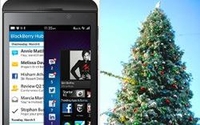Commentary
Mobile/Showrooming To Drive Holiday E-Commerce Despite Security Grinch
- by Steve Smith , Staff Writer @popeyesm, October 9, 2013
 An Accenture survey of over 500 shoppers getting ready for holiday shopping projects that we will be spending 11% more this year than last. U.S. consumers say they will spend on average $626 on
gifts, although only one in five are planning to shell out more than in 2012.
An Accenture survey of over 500 shoppers getting ready for holiday shopping projects that we will be spending 11% more this year than last. U.S. consumers say they will spend on average $626 on
gifts, although only one in five are planning to shell out more than in 2012.
The PC is still the most common online tool for buying (47% of consumers), but plans to make purchases on tablets have climbed from 15% last year to 19% this year. Similarly, using smartphones as buy buttons has climbed from 14% last year to 18% this year. In fact, the main concern holding back even greater use of devices for purchasing involves concerns over security and privacy (28%), which is up from last year (26%). On the other hand, last year’s chief frustration with usability for shopping on tablets and smartphones (28%) has fallen remarkably to 18%). Curiously, consumers cite difficulty in finding the products they want via their devices (17%) more often this year than last (12%). Perhaps this is as much an indication of how much more ambitious mobile searches have become.
The role of showrooming in the holiday shopping cycle is now pretty much undeniable, although its actual impact on retailer sales is always debatable. A third of users now say the main reason they will use a device while shopping is to compare prices while in a store, up from 19% last year. For showrooming overall, 63% of holiday shoppers now say they are somewhat or very likely to go to a store to look for a gift and then find and purchase the item online for a better price. The intent to showroom is up from 56% last year.
How much of this showrooming actually increases m-commerce is less clear. Most people (69%) will wait until they get home to use their PC. But 12% -- the same percentage as last year -- say they will use their mobile device while in the store to make the purchase elsewhere. The share of people who say they will make the purchase on their device, but later in the shopping trip, has actually declined since last year from 15% to 11%.
For retailers worried about the showrooming impact on brick-and-mortar sales, it is best to keep in mind that Accenture also sees a profound “Webrooming” reverse effect. In this scenario, people do pre-shopping online and then go to the store, where they find the item and make the purchase. Accenture finds that 65% of holiday shoppers are somewhat or very likely to do this.



